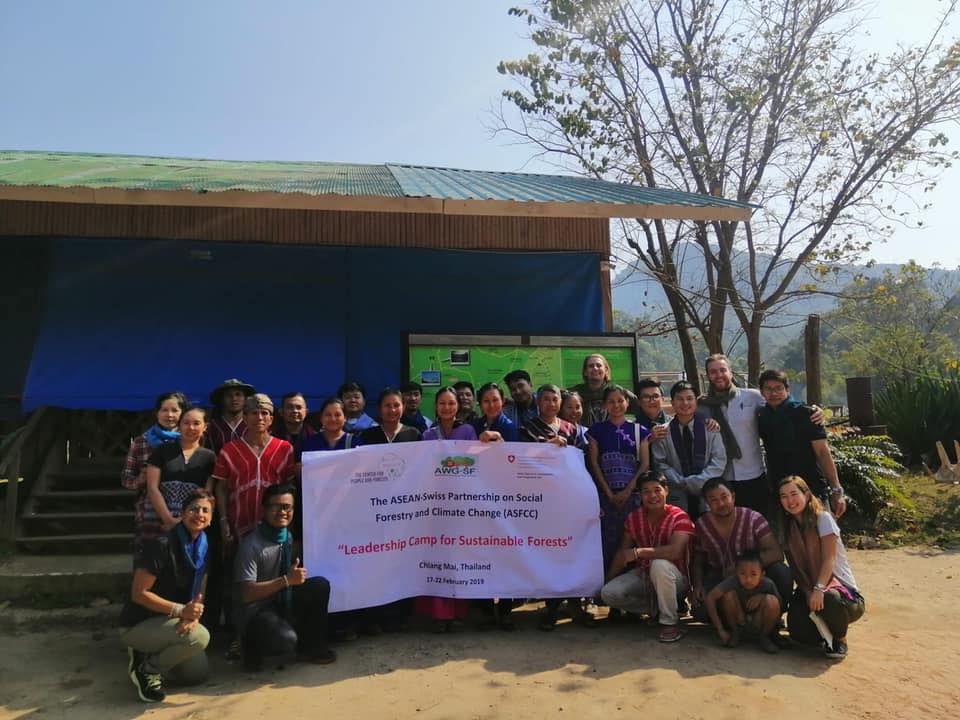Leadership camp in Thailand helps youth in Asia strengthen leadership skills

The camp was hosted by RECOFTC and the ASEAN Working Group on Social Forestry (AWG-SF). It was made possible with the support of the Swiss Development Cooperation (SDC) and the community of Baan Mae Klang Luang.
The 12 participants between the ages of 23 and 35 travelled to Baan Mae Klang Luang to learn about the community’s experience of living sustainably within a national park. The participants came from 10 countries. Seven were from ASEAN government departments and five were from non-governmental organizations.
Baan Mae Klang Luang’s own history of conflict and collaboration formed the backdrop to how communities, non-governmental organizations and governments can equitably manage landscapes through leadership and collaboration. The camp, Leadership for Sustainable Forests, was hosted by the ASEAN-Swiss Partnership on Social Forestry and Climate Change.
Trung Hieu Doan was one of the participants. He first heard about the camp from his coordinator at Viet Nam’s Academy of Forest Science, the research arm of the central government’s Ministry of Agriculture and Rural Development.
As a researcher for the academy, Trung was unsure how his work on silviculture in the remote areas in Northwest Viet Nam would correlate with the ASEAN-Swiss Partnership on Social Forestry and Climate Change’s “Leadership camp for sustainable forests.”
“I hadn’t really thought about leadership before,” Trung said. “I still thought leadership was a soft skill. It wasn’t until I went to the camp that I realized how important leadership skills are when taking into account all of the factors that are involved in landscape management.”
The participants discussed theories on leadership and applied them through forest walks, panel discussions, individual conversations with community leaders and two final projects. One was working with the coffee enterprise to develop new packaging and marketing strategy for their coffee. The second was working with Baan Mae Klang Luang’s community tourism network to develop an Instagram account and upgrade its Facebook page to attract more ASEAN and outside visitors.

By living and working with community members, the leaders were able to see how a community can envision new futures.
“Living in the community and going to the national park, these all helped me understand the dynamic between livelihoods, local communities and the actual landscape,” Trung said.
For Trung, these lessons were most apparent in how the village chief Phongthu interacted with the community and his approach to conflict and landscape management. Trung was inspired by Phongthu’s vision for the community and by his ability to unify the community during troubling times.
According to Trung, the participants developed a better understanding of leadership in the context of landscape management by observing it in practice. But of more importance was the lasting effect it had on his own thinking in Viet Nam.
“Baan Mae Klang Luang was like a case study,” Trung said, referring to a couple of instances when he was working in remote parts of Viet Nam. “During my work, I would think back on my experience and look for the leader in the community. I would then ask myself what motivated the community to do good for the landscape.”
Trung believes that in many communities, the primary motivation can be linked to livelihoods and providing the community with a voice. It was in Baan Mae Klang Luang that Trung first noticed this.
“I still try to look back and reflect on those experiences,” Trung said about the camp and the lessons he took home with him from Baan Mae Klang Luang. “It is always better if you try to apply what you are learning into practice. The leadership camp definitely helped. It changed the way I think.”
###
The ASEAN-Swiss Partnership on Social Forestry and Climate Change (ASFCC) project is funded by the Swiss Agency for Development and Cooperation (SDC), in cooperation with the ASEAN Working Group on Social Forestry (SWG-SF).
RECOFTC’s work is made possible with the support of the Swiss Agency for Development and Cooperation (SDC) and the Swedish International Development Cooperation Agency (Sida)

